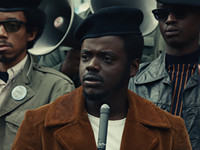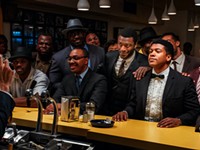[
{
"name": "500x250 Ad",
"insertPoint": "5",
"component": "15667920",
"parentWrapperClass": "",
"requiredCountToDisplay": "1"
}
]
In his fantastic essay, "Why I Am Hopeful" for Filmmaker Magazine, writer and film festival programmer Eric Allen Hatch reflects on the growing divide between independent cinema and the art house pipeline that churns out increasingly corporatized product. Hatch rightly suggests that "indie" film culture has been diluted over the years by "soft hipster rom-coms, complacent costume dramas, talking-head docs, and late-career Woody Allen turds" that fill art house theaters at the expense of all else.
Hatch's essay is enraging to read, but as the title suggests, he remains cautiously optimistic. In his view, the antidote to independent film culture's stagnation is an injection of young, fresh, and diverse voices in cinema.
Which brings us to the outrageous, wholly original, and dementedly weird "Sorry to Bother You," from hip-hop artist and activist Boots Riley, making his feature directorial debut. With a swaggering, anti-establishment, punk rock attitude, his film has a vision as original and uncompromising as you're likely to see in theaters this year.
Fueled by a righteous anger, Riley's film is an excoriation of late-stage capitalism and greed that plays like a fever dream. It's a film with a lot on its mind, cramming in Riley's thoughts on art, commerce, race, and economic inequality; a second viewing (at the very least) may be required to sort through it all. I'm still not entirely sure it all completely comes together, but with a film so jam-packed with provocative ideas, it's almost inevitable that a few aren't going to land.
Set in an alternate universe Oakland, "Sorry to Bother You" follows Cassius Green (Lakeith Stanfield, "Get Out"), a young, underemployed black man desperately trying to make ends meet.
In his quest for gainful employment, he lands a job as a telemarketer, but struggles until his co-worker (Danny Glover) advises him that he'll find more success by adopting a "white voice" when making calls.
Cassius tries out the technique, and as the nasally tones voiced by David Cross emerge from Stanfield's mouth, customers are suddenly much more receptive to his sales pitches. With that tool in his pocket, Cassius is soon climbing the corporate ladder with unprecedented speed, making his way upstairs to rub elbows with his fellow "power callers." Meanwhile, his co-worker Squeeze (Steven Yeun) has begun banding together the downstairs workers, pushing them to unionize and demand more pay.
As Cassius's star rises, he catches the eye the company's coke-snorting CEO Steve Lift (Armie Hammer), who invites him to a debaucherous party at his mansion in an effort to woo him into joining the upper echelon of the company, where he'll be tasked with selling some things people most definitely shouldn't be selling.
Cassius's performance artist girlfriend, Detroit (Tessa Thompson, sporting a series of boldly confrontational earrings -- "Murder MurderMurder, Kill KillKill" being one of the more eye-catching slogans) makes it clear she disapproves of his actions, though she's not above doing her own version of the "white voice" to attract more attention to her art.
What starts as a riff on the concept of code-switching, inspired by Riley's own experiences in telemarketing, spirals off into weirder and weirder territory, and the narrative embraces absurdity with increasingly reckless abandon. Riley's script considers how "selling out" has entirely different, painful connotations for African-Americans if they choose to give in to a socioeconomic system that has, throughout history, quite literally made money off their bodies.
Influenced equally by the revolutionary cinema of the 60's and 80's-era stoner comedies, Riley's film calls to mind everything from Robert Downey Sr.'s 1969 anti-corporate satire "Putney Swope" to "Bill and Ted's Excellent Adventure," in addition to the work Spike Lee and Charlie Kaufman.
Riley fills his movie with some delightful visual gags, like the way he makes the intrusion of telemarketing entirely literal, showing Cassius's desk dropping from the sky and crashing into the homes of the people he's calling. There's a bit of Michel Gondry to the film's rough-around-the-edges aesthetic, and as if acknowledging the debt he owes, Riley incorporates a hilarious late-film nod to that director's work.
"Sorry to Bother You" is only the first feature for Boots Riley, and I can't wait to see where he goes next. Sprawling and messy, thrillingly ambitious and bursting with ideas, this is truly independent cinema in support of a bold, utterly original vision. Even if the film sometimes overreaches, I can forgive the occasional clumsiness of a first-time filmmaker if it means getting more movies as vital, passionate, funny, and thoughtful as this one.
Speaking of...
-

Crystal Z Campbell's 'Lines of Sight' honors Tulsa and tenacity at MAG
Mar 29, 2023 -

A new Dunwoody displayed at the MAG
Jan 20, 2022 -

Meet the Rochester pianist who makes silent movies sing
Oct 26, 2021 - More »









